2025 Peugeot Boxer: Everything You Need To Know
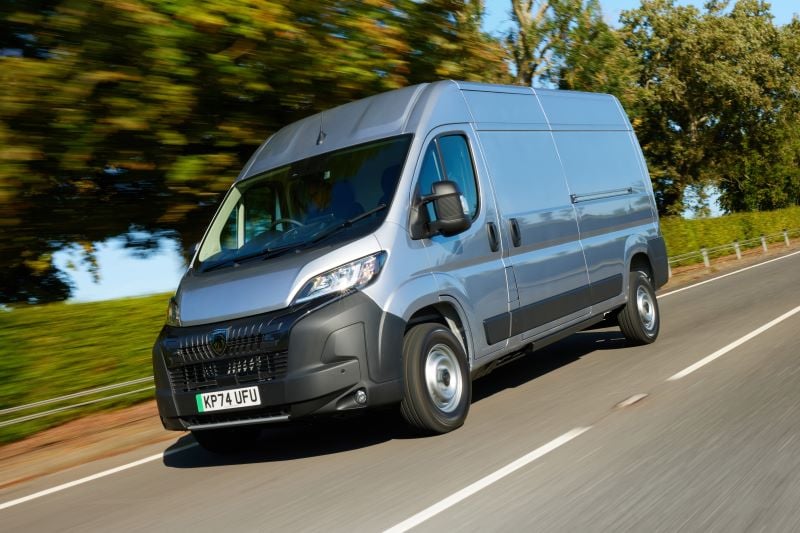
From the Peugeot Boxer to the Renault Master, the Ford Transit to the Mercedes-Benz Sprinter, the large van class may have an excess in quantity right now, but it is without doubt an excess in competitive quality too.
Indeed, the biggest of the light commercial vehicle segments is brimming with talented options at the moment with legacy brands, such as Ford, Volkswagen, Peugeot and Vauxhall being challenged by convincing rivals from lesser-known marques like Maxus, MAN and Iveco.
It makes standing out from the crowd a particular challenge, especially if you happen to offer a model that is very similar to other van built on the same platform.
Take the Peugeot Boxer, for example, it has a job to stand out in a crowded sector but with a frugal electric variant (the Peugeot E-Boxer), a vast load bay and generous smart-connected technology, it holds sway as one of the most popular.
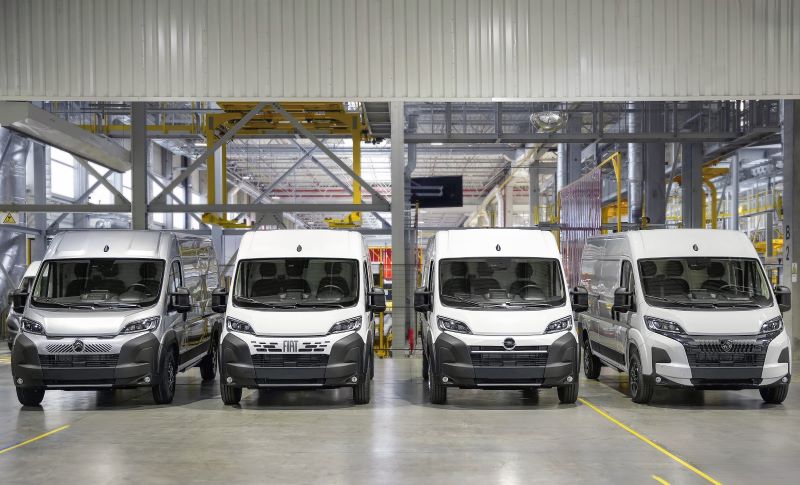
One Van, Multiple Interpretations
If you know your vans, then you’ll know all about the badge-engineering that exists between some of the most popular models in the large commercial vehicle sector.
In Peugeot’s case, it has for a long time developed its commercial vehicle range alongside fellow French brand Citroen, the result of it being part of the PSA Group that comprised the two marques.
The Boxer nameplate itself came into service in 1994 as part of a deal between PSA and FIAT to develop a new commercial vehicle range. Since then, the Peugeot Boxer, Citroen Jumper (known as the Citroen Relay in the UK) and FIAT Ducato have been developed on the same platform.
In recent years, the PSA Group has expanded to include Vauxhall/Opel, which saw the Vauxhall Movano (the largest model in British/German company’s range) switch sides from being based on the Renault Master platform to be built alongside the Boxer/Relay/Ducato.
The partnership was solidified in 2021 when the PSA Group merged with FIAT-Chrysler to create a new automotive ‘super-group’ known as Stellantis Group.
It meant a further expansion on the large van platform to include a US-market only version, sold as the RAM Promaster.
More than that though, even Toyota has gotten in on the act with a large van, known as the Toyota Proace Max, while there will be seventh version of the platform on the way in 2026 with the launch of the Iveco eSuperJolly.
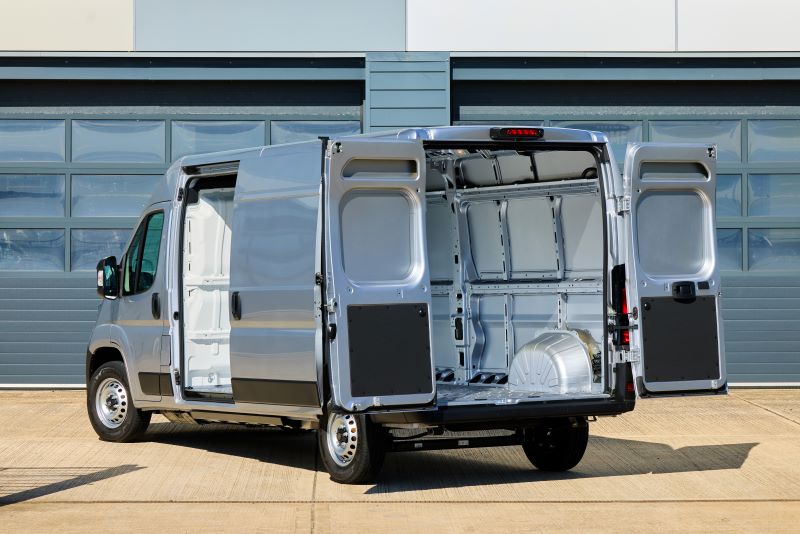
2025 Peugeot Boxer: Dimensions, Loads & Body Styles
| L2 H1 | L2 H2 | L3 H2 | L3 H3 | L4 H2 | L4 H3 | |
| Length | 5358mm | 5413mm | 5998mm | 5998mm | 6363mm | 6363mm |
| Height | 2254mm | 2522mm | 2522mm | 2760mm | 2522mm | 2760mm |
| Wheelbase | 3450mm | 3450mm | 4035mm | 4035mm | 4035mm | 4035mm |
| Load Length | 3120mm | 3120mm | 3705mm | 3705mm | 4070mm | 4070mm |
| Load Width | 1870mm | 1870mm | 1870mm | 1870mm | 1870mm | 1870mm |
| Load Height | 1622mm | 1932mm | 1932mm | 2172mm | 1932mm | 2172mm |
| Load Volume | 10 cu m | 11.5 cu m | 13 cu m | 15 cu m | 15 cu m | 17 cu m |
| Maximum Payload | 1500-1735kg | 1414-1475kg | 710-1460kg | 1400-1435kg | 1265-2115kg | 1235-1385kg |
| Braked Towing Capacity | 2500-3000kg | 2500kg | 2400-2500kg | 2400-2500kg | 2400-3000kg | 2400-3000kg |
| Gross Vehicle Weight | 3500kg | 3500kg | 3500-4250kg | 3500-4250kg | 3500-4250kg | 3500-4250kg |
The Peugeot Boxer is offered in myriad dimensions to suit your cargo needs with three different lengths and two heights offered in varying configurations.
Whichever body size you choose, the Boxer ranks among the most practical in the large van class with upwards of 17 cubic metres available in its largest guise (L4/H3).
The range starts with the L2/H1, which offers a 3120mm load length at floor for 10 cubic metres of load space. The model is one of the more compact offerings in the large van class with most rival ranges starting at L2/H2, making it ideal for those who need more space than a Medium Van without the unwieldiness of an extended large van.
Load space rises to 11.5 cubic metres for L2/H2 and on to 13 cubic metres for the best-selling version in the range, the L3/H2. This is complemented by having a generous load length of 3705mm.
L3/H3, L4/H2 and L4/H3 models are also available with the largest measuring 6363mm in external length, translating to a load length of 4070mm. These models offer 15 cubic metres (L3/H3 and L4/H2) and 17 cubic metres (L4/H3) in load space respectively.
Taking the most popular model in the range – the L3/H2 – as an example, the Boxer measures up as having one of the biggest cargo holds in the large van class, bettered only by the Volkswagen Crafter/MAN TGE and the Mercedes-Benz Sprinter.
Unusually, the longest versions of the Boxer – the L4 – differs from rivals by placing the extended length behind the rear-axle, rather than increasing the length of the wheelbase. As such, the L3 and L4 have identical wheelbase dimensions.
In terms of payload, there is a noticeable difference in available capacity between the diesel versions of the Boxer and the electric Peugeot E-Boxer.
In diesel guise, the Boxer offers payloads ranging between 1200kg and just under two tonnes, putting it on a par with other models in the large van class.
However, this reduces to 710kg on selected models using the electric powertrain. This is due to the heavier weight of a battery unit compared to an engine, which eats into the Boxer’s overall gross vehicle weight capacity of 3500kg.
Despite this, the Boxer and E-Boxer are almost on a par in terms of towing capacity with maximum braked weights ranging between a low of 2400kg and rising to a maximum of 3000kg.
In addition to the Panel Van, the Peugeot Boxer is also available in a Window Van, which is capable of carrying more passengers, while Peugeot Boxer Dropside and Tipper Vans are also offered.
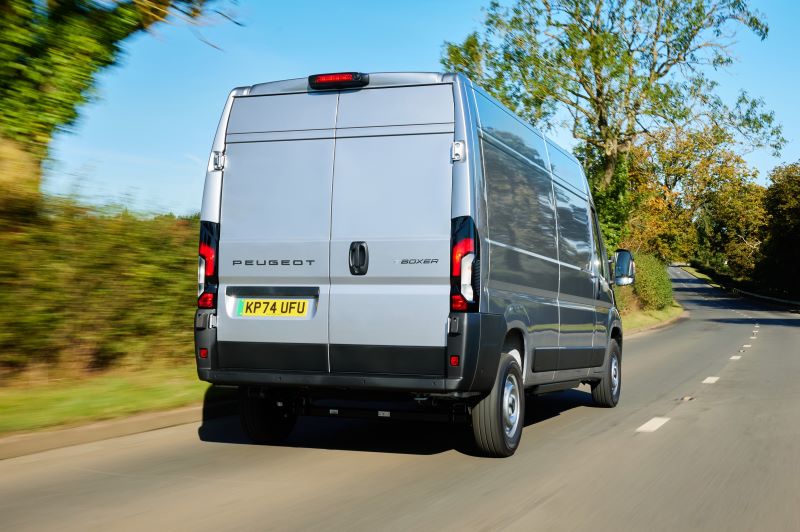
2025 Peugeot Boxer: Engine, Performance & Electric
| 2.2 BlueHDi 140 S&S | 2.2 BlueHDi 180 S&S | 110kWh Electric 335 | 110kWh Electric 440 H2 | 110kWh Electric 440 H3 | |
| Powertrain | Diesel | Diesel | Electric | Electric | Electric |
| Engine Capacity | 2184cc | 2184cc | 110kWh Battery | 110kWh Battery | 110kWh Battery |
| Transmission | Manual/Auto | Manual/Auto | Automatic | Automatic | Automatic |
| Max Power | 138bhp | 177bhp | 275bhp | 275bhp | 275bhp |
| Max Torque | 350Nm @1400rpm | 380Nm @1500rpm | 410Nm | 410Nm | 410Nm |
| Max Speed | 99mph | 56mph | 81mph | 56mph | 56mph |
| 0-62mph | 14-16secs | N/A | 10.0secs | N/A | N/A |
| Fuel Economy [Comb] | 37-44mpg | 28-35mpg | 235 miles range | 263 miles range | 254 miles range |
| CO2 [Comb] | 169-184g/km | 200g/km | 0g/km | 0g/km | 0g/km |
| Fuel Tank Capacity | 90 litres | 90 litres | N/A | N/A | N/A |
The Peugeot Boxer is offered with either a 2.2-litre turbodiesel engine or a 110kWh battery unit for the electric E-Boxer model.
Opt for the diesel and you can choose between ‘140’ and ‘180’ versions of the engine. The figures equate the level of power generated by the engine with the 140 being a 138bhp turbodiesel, while the 180 is a 177bhp turbodiesel.
While the 180 is the more appropriate choice for model with the larger dimensions with its 380Nm of torque, the 140 has cleaner emissions and is more frugal at up to 44mpg. The 140 also doesn’t have speed limited to 56mph.
Compared to rivals, such as the equivalent Ford Transit, Renault Master and Maxus Deliver 9, the Peugeot Boxer 2.2 BlueHDi 140 Professional Automatic L3 H2 is among the most powerful, while it also has the largest fuel tank at 90 litres.
As for the electric Peugeot E-Boxer, it features one of the largest batteries in the class, which has been fettled to maximise range without affecting outright power.
It means the E-Boxer is capable of between 235 and 263 miles on a single charge, identifying it as one of the most frugal large vans in the segment. This is despite it being the most powerful large van in the class at 275bhp by some stretch.
As a comparison, the Ford E-Transit manages between 196-249 miles and Maxus eDeliver 9 does 186-205 miles, though it is bettered by the new Renault Master/Nissan Interstar’s 285 miles.
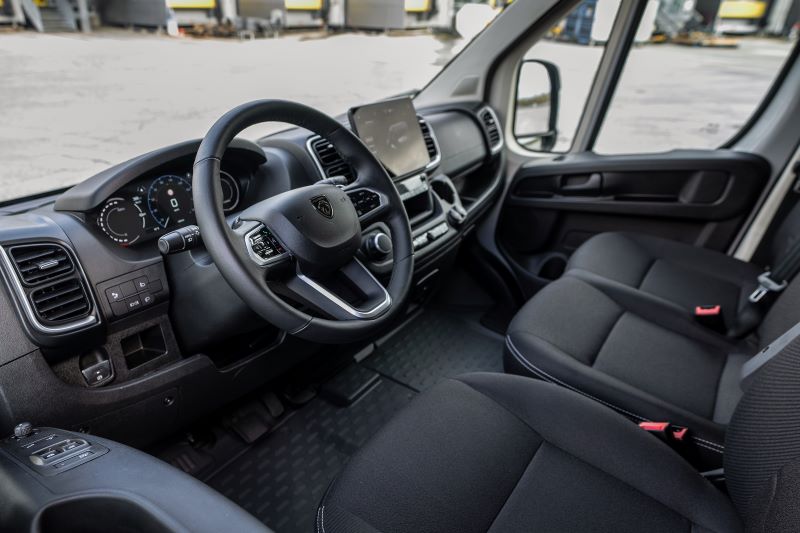
2025 Peugeot Boxer: Specification, Features & Safety
| L2 H1 | L2 H2 | L3 H2 | L3 H3 | L4 H2 | L4 H3 | |
| 2.2 BlueHDi 140 S&S Professional | X | X | X | X | X | X |
| 2.2 BlueHDi 180 S&S Professional | X | |||||
| 110kWh Electric Professional | X | X | X | X |
Just a single trim level – Professional - is offered across the entire Peugeot Boxer and Peugeot E-Boxer range.
Standard equipment on all models therefore includes:
- Air Conditioning
- Rear Parking Sensors
- Cruiser Control with Variable Speed Limiter
- Electric Door Mirrors
- Electric Windows
- 5” DAB Radio with Bluetooth
- 7” Touchscreen Display with Apple CarPlay/Android Auto
- Driver & Front Passenger Airbags
- Advanced Emergency Braking System
- Lane Keep Assist
- Traffic Sign Recognition
- Driver Attention Alert
- Intelligent Speed Assistance
- Tyre Pressure Monitoring System
- Remote Central Deadlocking
- Remote Control Security Alarm System
The Peugeot Boxer has been awarded a five-star EuroNCAP safety rating placing it among the safest models in the large van class.
Though the Boxer itself wasn’t tested by EuroNCAP, examiners instead deemed the results of a test using a Fiat E-Ducato sufficient to be applied to sister models, including the Peugeot equivalent, plus the Vauxhall Movano and Citroen Dispatch.
EuroNCAP states that the Boxer ‘is a good choice for those looking for safety in a commercial van’ though reveals ‘crash avoidance’ technology performance could be improved after scoring only 64%, compared with the class leading Ford Transit’s 93%.
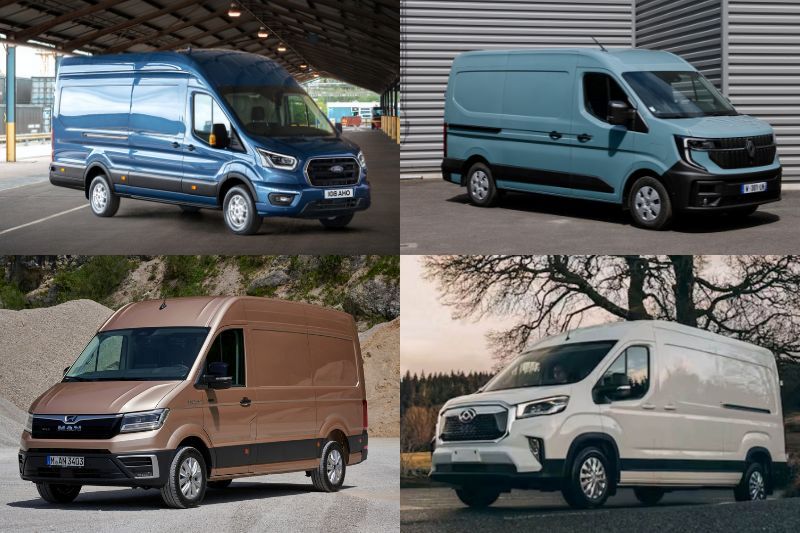
How Does The Peugeot Boxer Compare To Its Rivals?
| Peugeot Boxer 2.2 BlueHDi 140 Professional Auto L3 H2 | Ford Transit 2.0 EcoBlue 130 Trend Auto L3 H2 | Renault Master 2.0 Blue dCi 130 Advance L3 H2 | MAN TGE 2.0 TDi 130 3.140 L2 H2 | Maxus Deliver 9 2.0 TDi L3 H2 | |
| Powertrain | Diesel | Diesel | Diesel | Diesel | Diesel |
| Engine Capacity | 2184cc | 1995cc | 1998cc | 1986cc | 1996cc |
| Max Power | 138bhp | 129bhp | 129bhp | 138bhp | 148bhp |
| Max Torque | 350Nm @1400rpm | 385Nm @1500rpm | 350Nm @1500rpm | 340Nm @1600rpm | 375Nm @1500rpm |
| Fuel Economy [Comb] | 41mpg | 36mpg | 37mpg | 33mpg | 29mpg |
| CO2 [Comb] | 183g/km | 226g/km | 203g/km | 228g/km | 237g/km |
| Fuel Tank Capacity | 90 litres | 80 litres | 80 litres | 75 litres | 80 litres |
| Length | 5998mm | 5981mm | 6311mm | 5986mm | 5940mm |
| Height | 2522mm | 2411mm | 2500mm | 2590mm | 2535mm |
| Wheelbase | 4035mm | 3750mm | 4215mm | 3640mm | 3760mm |
| Load Length | 3705mm | 3533mm | 3816mm | 3450mm | 3413mm |
| Load Volume | 13 cu m | 11.5 cu m | 13 cu m | 11.3 cu m | 11.5 cu m |
| Maximum Payload | 1365kg | 1310kg | 1905kg | 2203kg | 1215kg |
| Towing Capacity | 2500kg | 2800kg | 2500kg | 3000kg | 2800kg |
| Gross Vehicle Weight | 3500kg | 3500kg | 3500kg | 3500kg | 3500kg |
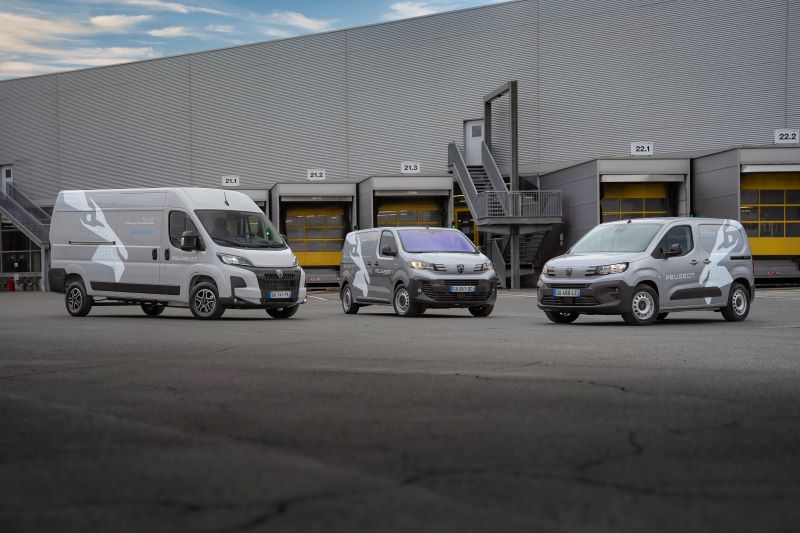
Lease A Peugeot Van With Vansdirect
Leasing a new van with Vansdirect has never been easier and better value.
Get the right van at the right deal, right now with the best Peugeot van leasing deals available across the entire range, including the Peugeot Partner, Peugeot Expert and Peugeot Boxer.
Speak to our expert team today and you could be driving a new van for less than you think, sooner than you thought.

















